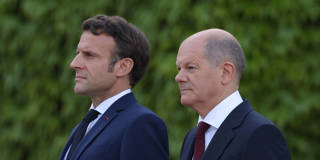
Why Europe’s Franco-German Engine Is Stalling
Sixty years after the Élysée Treaty ended two centuries of enmity and established a fruitful partnership between Germany and France, Europe’s de facto leaders are at odds over how to address multiple economic and geopolitical challenges. The fate of Europe may depend on their ability to find common ground.
PARIS – In January 1963, German Chancellor Konrad Adenauer and French President Charles de Gaulle signed the bilateral Élysée Treaty, whereby the two former enemies officially ended two centuries of antipathy and bloodshed and committed to ushering in a new era of cooperation.